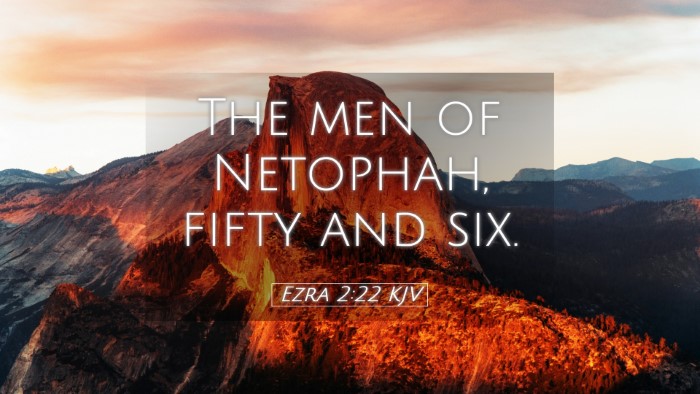Commentary on Ezra 2:22
Ezra 2:22 presents a significant detail in the genealogy and returning exiles from Babylon to Jerusalem. It states: "The children of Asher, three hundred and twenty." This concise recording holds deep theological meaning and historical context, which we will explore through insights from various public domain commentaries.
Introduction to the Context of Ezra 2
Ezra, as a book in the Old Testament, is crucial for understanding the post-exilic community of Israel. The second chapter lists the families and tribes that returned to Jerusalem after the Babylonian exile. This logistic account not only serves a census purpose but also emphasizes God's faithfulness to His promises concerning Israel's restoration.
Genealogical Importance
From a genealogical perspective, the listing of families and numbers is significant as it re-establishes identity among the returning Jews. Matthew Henry notes that “the family of Asher” forms part of the whole, demonstrating that none of the tribes are forsaken by God. Each tribe's acknowledgment highlights the faithfulness of God to His covenant.
Understanding the Tribe of Asher
The tribe of Asher, one of the sons of Jacob, holds a unique historical and spiritual legacy. The remarks made by Adam Clarke indicate that Asher was prophesied to have prosperity: “Out of Asher his bread shall be fat, and he shall yield royal dainties” (Genesis 49:20). Thus, the return of this tribe can be seen as a fulfillment of that prophecy, reflecting God's promises being fulfilled through their physical return to the Promised Land.
Numerical Significance
The number “three hundred and twenty” may appear merely logistical; however, it has deeper implications. Albert Barnes comments on how numbers throughout the Scriptures often signify more than their face value. In the biblical context, the number 300 can suggest completeness or a fullness of expression of God's will.
Key Insight: The total of 320 may symbolize the fulfillment of God’s sovereignty over the exiles and His provision for them as they reconstruct their lives and the temple. It further signals a community ready to embark on a new chapter in their collective faith journey.
Implications for Leadership and Community
For pastors and church leaders, the detailed account of returning exiles serves as a model of godly leadership prioritizing community and identity. Ezra's role in gathering these people reflects the importance of shepherding God's flock with care, ensuring every tribe and family is accounted for, confirming their place in the community of faith.
Lessons in Organization
Matthew Henry emphasizes the orderly arrangement of the exiles as they return, which is a profound lesson regarding the importance of structure within the church. The meticulous nature of these lists reminds us that God is a God of order. As such, it calls church leaders to cultivate environments where every member feels valued and recognized.
Theological Reflections
This verse provides not only a historical account but also profound theological reflections. The presence of the tribe of Asher among the returning exiles is an illustration of God's grace extended to all His children, despite previous disobedience or estrangement caused by exile. This act of restoration mirrors the larger narrative of redemption found throughout the Scriptures.
God's Faithfulness
By bringing the people back, God fulfills His promises, reminding readers of His faithful character. Albert Barnes stresses that this act of restoration speaks volumes about God's attentiveness to His covenant community, delivering His people not only from physical exile but also spiritual estrangement.
Conclusion
In summarizing Ezra 2:22, we find an intersection of history, theology, and practical application. The return of the tribe of Asher with a specific number serves as a testimony of God's faithfulness and a model for community building and leadership within the church today. As pastors, students, theologians, and Bible scholars reflect upon this verse, may it not only enrich understanding but also inspire action towards unity, remembrance, and the pursuit of God's redemptive purpose in our communities.


